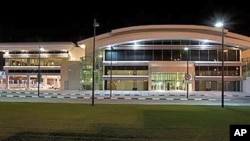New revelations from WikiLeaks show haggling between U.S. diplomats and foreign governments over sales of high-tech products worth tens of billions of dollars that support thousands of American jobs.
An article Monday in The New York Times quotes U.S. diplomatic cables made available through the controversial WikiLeaks website. The incidents are not surprising, but this report shows the process in greater detail than ever before.
The Times article focuses particularly on diplomatic aid to Boeing Aircraft as it competes with European rival Airbus.
In one case, the cables say the Saudi king made it clear he would view a Boeing sale more favorably if his personal jet were outfitted with the same high-tech telecommunications and defensive devices found on Air Force One, the U.S. presidential aircraft.
Other nations sought landing rights in New York, help for air safety, or a chance for an astronaut to join a U.S. space flight as part of the bargain to approve the purchase of U.S.-made planes.
The Times says diplomats reported these requests and Washington took action on some of them.
It quotes an analyst who has done work for Airbus as saying the diplomatic aid undermines Washington's contention that Airbus get an unfair level of government aid. The Times also noted that Airbus gets diplomatic help, including a proposed international visit by the French president in one case.
Moreover, the article reported U.S. diplomats turned away requests to hire "agents" who charge steep commissions to help gain access to top officials.
WikiLeaks: US Diplomats Help Boeing Sales




